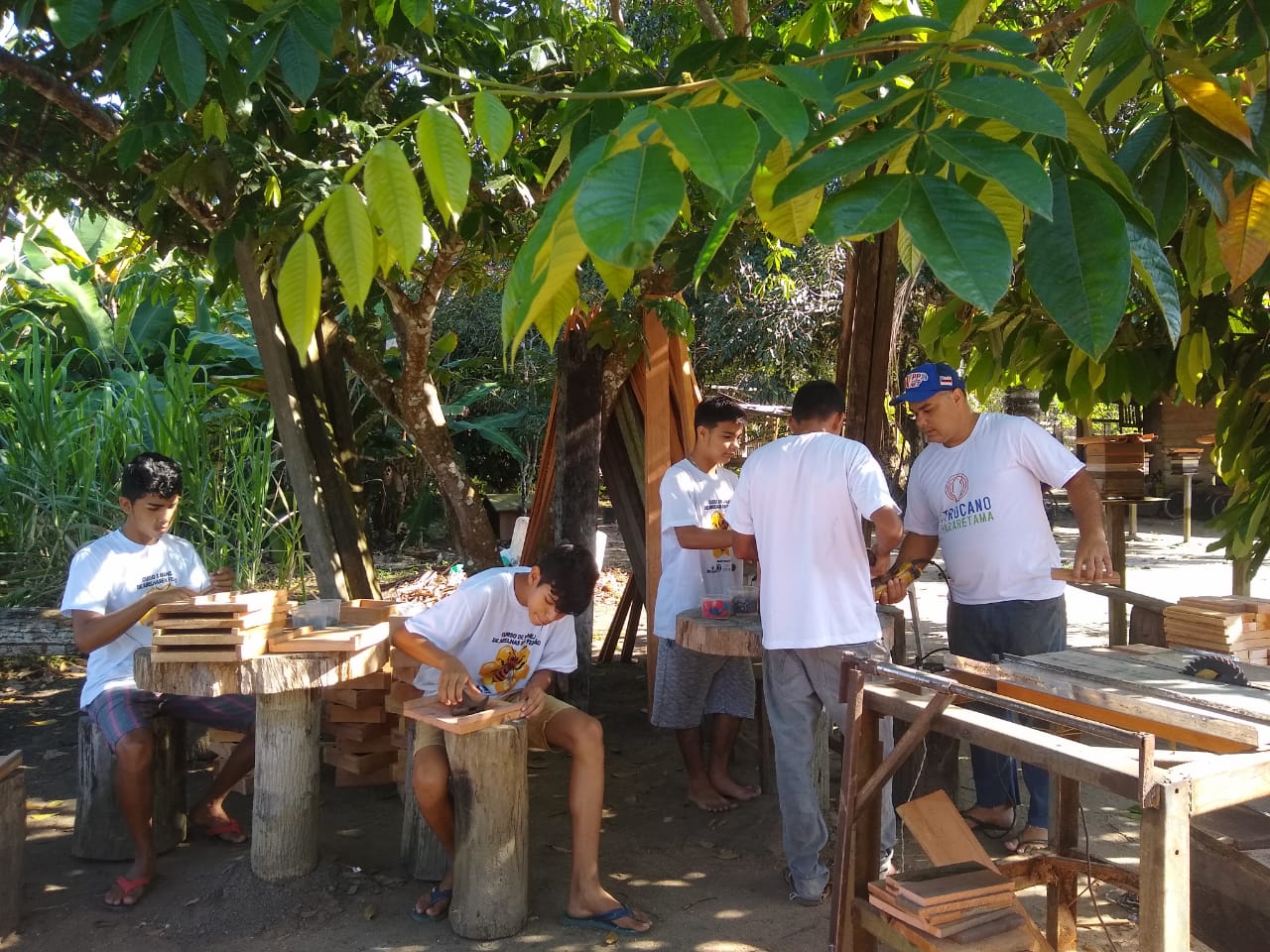Stingless Bees Training in the Trocano Araretama Project.
During 2022, a number of stingless bee breeding training courses were implemented in the Trocano Araretama Project. Together with the Municipality of Borba, the Institute for Sustainable Agricultural and Forestry Development Amazonas (IDAM) and Go Balance, the project team implemented the training in several communities throughout the Trocano project area.
Stingless Bee Breeding is known as meliponiculture, and it is an important and beneficial practice for the environment and communities.
Training for local community members
These courses were very well-attended by community members, many of whom are rural producers. There are a number of local, family-run cocoa, papaya and acai plantations in the area which will gain from learning and implementing meliponiculture techniques.
Training was delivered by a meliponiculture and beekeeping expert from the National Research Institute of Amazonia in Manaus (INPA). During the sessions, the students learned important management and care techniques. They were also instructed on how to build the bee breeding boxes. They were also trained in installing, handling, and maintaining the bee boxes.
Why Stingless Bees?
Meliponiculture generates great benefits to the environment. This is through pollination, in a way that contributes to the regeneration of forests and increased biodiversity.
It is also important for local residents, as it creates excellent economic opportunities for the breeders to sell the honey, wax and other by-products. This can help support the rural communities and create further opportunities for the future.
Benefits for the Trocano Project area
We spoke to the Trocano Project manager, Joaquina Lourenco. We asked her to tell us more about the benefits of implementing these training courses in the communities of Borba. “Although the practice of meliponiculture is a considerably simple activity, the factors involved are quite complex, with a great wealth of interactions between the population and the environment.”
Importance in Agriculture
Joaquina: The focus of the meliponiculture courses of the Trocano Araretama Project is on the riverside communities. 95% of the students are family farmers, where they plant with the main objective of supporting their families and infrequent sales in the community itself or in Borba town.
By visiting each flower in search of food, bees perform an essential service for the development of crops and pollination. The young bee (Plebeia sp. Aparatrigona impunctata), for example, is one of those responsible for the pollination of the Cupuassu tree (Theobroma grandiflorum). Highly appreciated, Cupuassu is a fruit widely used in natural juices and sweets in the Amazon region.
Meliponiculture and Sustainability
Joaquina: Students and farmers comment that the main interest in meliponiculture training is because raising native bees is a way to improve production. When they realized this evolution of the plantations, they showed even greater interest in becoming a professional breeder. To qualify as a professional breeder, they need to reach 50 boxes of bees and acquire the unique environmental license from IDAM, thus enabling them to commercialize other products derived from honey such as jelly, liqueur, propolis, etc.
It is noteworthy that contact with native stingless bees is nothing new. It is well-known that indigenous ethnic groups already used bee products, later certified as therapeutic by science. The riverside people of the Amazon also have a relationship with these species, which they call Jandaíraâ.
Maintenance of Biodiversity
Joaquina: We all know that biodiversity is under threat. The impacts caused by global warming and unsustainable business practices are many and put fauna, flora and humans at risk. The creation of native stingless bees helps in the conservation of bee species and plants dependent on pollination. The Amazon alone has around 130 catalogued bee species.
The work carried out by the Trocano Project in these communities is already reaping good results. The practice of removing honey in the forest is carried out by the riverside communities, taking care of the nests for their maintenance and the conservation of the bees.
The Trocano Araretama project prioritizes the maintenance of natural resources in the agroecosystem as a way of maintaining the socioeconomic and cultural vitality of farmers and their communities. Intervention proposals are developed to adapt to the reality and priorities of riverside producers.
This guidance takes place through knowledge of traditional management, identification of the potential and limitations of producers and their systems, and the participatory construction of solutions and experimentation.
Positive benefits to the communities of the Trocano project area
The Trocano Araretama project promotes these benefits through training and, in partnership with IDAM, advice on the activity as a whole. From planting to commercialization, supporting the process of community organization.
These stingless bees training courses were a great success. They have resulted in the farmers finding end-buyers in Manaus for the honey they are producing. This is a significant result for the newly qualified breeders. This enables them to generate much-needed income for themselves, and their families. The training and implementation also brings social benefits to their entire communities.
Ciaran Kelly, Go Balance CEO said: “These are the kind of initiatives which deliver the benefits that are the core of REDD+ projects”.
About the Trocano Project
The Trocano Araretama Project is a jurisdictional REDD+ carbon project that has been in active for 12 years. The project is developed by Go Balance in a public-private partnership with the Municipality of Borba.
The aims of the project are to avoid deforestation combined with bringing community, biodiversity, and socio-economic benefits to the area. The essence and success of the Trocano project focuses on delivering a combination of these benefits.
The project is periodically verified by independent, third-party qualified carbon auditors. As a result of successful verification, the project generates carbon offsets – issued as Natural Capital Credits.



Comments are closed